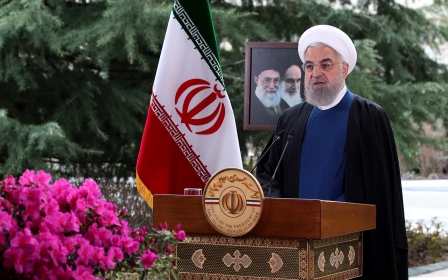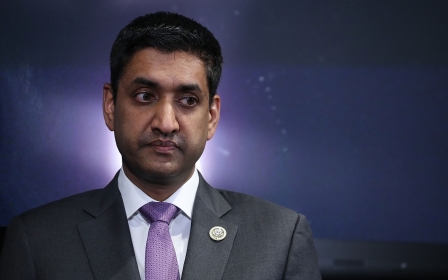Iran says success of upcoming nuclear talks depends on US lifting sanctions

Multilateral nuclear talks set to begin on Tuesday will not succeed if the other signatories to the 2015 Iran nuclear deal cannot convince Washington to lift its sanctions, Iran's foreign ministry spokesman has warned.
Saeed Khatibzadeh, speaking at a news conference on Monday, said the outcome of Tuesday's meeting in Vienna relies on France, Germany, the United Kingdom, China and Russia - known as the P4+1 - being able to get Washington to lift all Trump-era sanctions.
"If we can reach an agreement on the comprehensive lifting of sanctions with the P4+1 and they can guarantee US commitments, the path will be opened," Khatibzadeh said.
When announcing the talks last week, the multilateral Joint Commission for the Iran deal said the goal of the summit would be "to clearly identify sanctions lifting and nuclear implementation measures".
While Khatibzadeh said Iran's intentions going into the summit would be to focus solely on the lifting of US sanctions, he stressed that no "direct or indirect negotiations" will take place between Tehran and Washington during the meeting - a position also expressed by Foreign Minister Mohammad Javad Zarif last week.
New MEE newsletter: Jerusalem Dispatch
Sign up to get the latest insights and analysis on Israel-Palestine, alongside Turkey Unpacked and other MEE newsletters
"Tomorrow it will be clear whether the P4+1 can serve our interests or not," Khatibzadeh said.
'A mutual return'
On Friday, US State Department deputy spokesperson Jalina Porter said the talks in Vienna would be a "healthy first step forward", adding that both sanctions relief and any necessary steps it would require from Iran will be "up for discussion".
"The goal is obviously a mutual return to compliance with the JCPOA," she said, using the acronym for the original nuclear accord.
The Biden administration has demanded that Iran make the first move in a "compliance for compliance" strategy. However, in recent weeks US officials have been calling for talks to negotiate mutual and gradual compliance with the accord.
'There is only one step. It is a step that includes the lifting of all US sanctions'
- Saeed Khatibzadeh, Iran foreign ministry spokesman
"We can play games about who goes first. I think anyone who's dealt with this knows that neither side is going to go first entirely," US envoy for Iran Rob Malley said last month.
"There's going to have to be some agreement on choreographing, on synchronising. We're open to discussing that, but it's going to have to be discussed. It's not going to happen simply unilaterally by one side taking all the steps and waiting," he continued.
For its part, Iran has repeatedly indicated that it was the US - under former President Donald Trump - that withdrew from the deal in 2018, triggering Iran's breaches; and therefore it should be the US to make the first goodwill move in lifting sanctions.
"The path is clear. US sanctions must be completely lifted and verified. There is only one step. It is a step that includes the lifting of all US sanctions, and in return, Iran is ready to suspend its retaliatory measures," Khatibzadeh said during Monday's news conference.
"What we are saying today is that we should go back to January 2015 and all the sanctions that the United States has added and changed their labels, should be lifted," he continued.
US-Iran tensions
Khatibzadeh noted that the lifting of US sanctions against its oil industry is Iran's primary concern, with oil being the nation's top export.
Just before Trump pulled out of the JCPOA, Tehran was exporting around 2.5 million barrels of oil per day. Taking a drastic hit due to US measures, last year Iran's daily oil exports were estimated at 100,000 to 200,000 barrels.
Following the US's nuclear deal withdrawal, Tehran tried and failed for a year to garner enough European powers to convince the Trump administration to ease up on its "maximum pressure" campaign. As a result, Iran began to downgrade some of its commitments to the JCPOA agreement, moving out of compliance with the deal.
Hostility during that period brought the two countries to the brink of war, particularly in early 2020 when a US air strike in Baghdad killed top Iranian general Qassem Soleimani.
Biden has said that he intends to bring Washington back to the pact, but more than two months into his tenure, Washington and Tehran remain at an impasse on how to revive the accord.
Tuesday's talks come ahead of the Iranian presidential election on 18 June, a date that supporters of the deal fear could be a deadline for reviving the agreement, with President Hassan Rouhani - a former nuclear negotiator who is seen as pro-diplomacy - set to leave office because of term limits.
In Washington, Biden has been facing calls from Iran hawks, including some members of his own Democratic Party, to expand the nuclear deal to address Iran's ballistic missile programme and regional activities.
Tehran has ruled out amending the deal, insisting that it will not negotiate over what it calls its defence strategy, as Iranian officials accuse the United States of militarising the region with enormous arms deals to Saudi Arabia and the United Arab Emirates.
Middle East Eye delivers independent and unrivalled coverage and analysis of the Middle East, North Africa and beyond. To learn more about republishing this content and the associated fees, please fill out this form. More about MEE can be found here.





